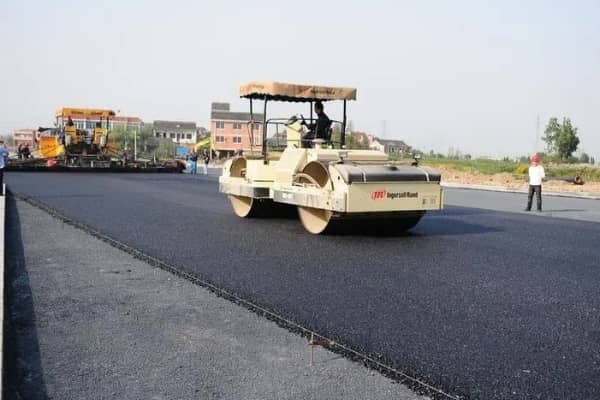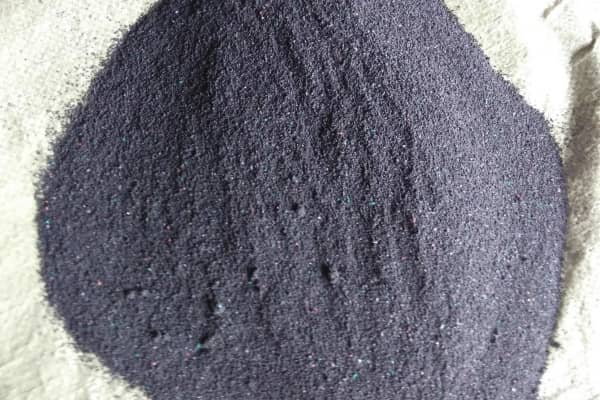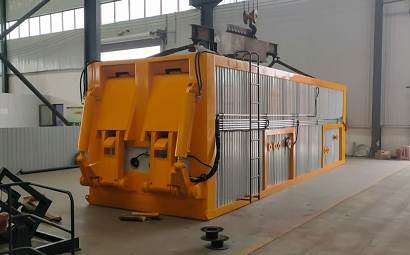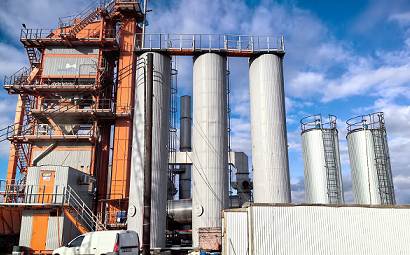1. Definition of rubber powder modified bitumen
Rubber powder modified bitumen (bitumen Rubber, referred to as AR) is a new type of high-quality composite material. Under the combined action of heavy traffic bitumen, waste tire rubber powder and admixtures, the rubber powder absorbs resins, hydrocarbons and other organic matter in the bitumen, and undergoes a series of physical and chemical changes to moisten and expand the rubber powder. The viscosity increases, the softening point increases, and the viscosity, toughness, and elasticity of rubber and bitumen are taken into account, thereby improving the road performance of rubber bitumen.
"Rubber powder modified bitumen" refers to the rubber powder made from waste tires, which is added as a modifier to the base bitumen. It is made through a series of actions such as high temperature, additives and shear mixing in a special special equipment. adhesive material
The modification principle of rubber powder modified bitumen is a modified bitumen cementing material formed by the full swelling reaction between tire rubber powder particles and matrix bitumen under fully mixed high-temperature conditions. Rubber powder modified bitumen has greatly improved the performance of base bitumen, and is superior to modified bitumen made of currently commonly used modifiers such as SBS, SBR, EVA, etc. In view of its excellent performance and great contribution to environmental protection, some experts predict that rubber powder modified bitumen is expected to replace SBS modified bitumen.


2. Characteristics of rubber powder modified bitumen
The rubber used for modified bitumen is a highly elastic polymer. Adding vulcanized rubber powder to the base bitumen can achieve or even exceed the same effect as styrene-butadiene-styrene block copolymer modified bitumen. The characteristics of rubber powder modified bitumen include:
2.1. The penetration decreases, the softening point increases, and the viscosity increases, indicating that the high-temperature stability of the bitumen is improved, and the rutting and pushing phenomena of the road in summer are improved.
2.2. Temperature sensitivity is reduced. When the temperature is low, the bitumen becomes brittle, causing stress cracking in the pavement; when the temperature is high, the pavement becomes soft and deforms under the influence of the vehicles carrying it. After modification with rubber powder, the temperature sensitivity of the bitumen is improved and its flow resistance is improved. The viscosity coefficient of the rubber powder modified bitumen is greater than that of the base bitumen, indicating that the modified bitumen has higher resistance to flow deformation.
2.3. Low temperature performance is improved. Rubber powder can improve the low-temperature ductility of bitumen and increase the flexibility of bitumen.
2.4. Enhanced adhesion. As the thickness of the rubber bitumen film adhered to the surface of the stone increases, the bitumen pavement's resistance to water damage can be improved and the road life can be extended.
2.5. Reduce noise pollution.
2.6. Increase the grip between the vehicle tires and the road surface and improve driving safety.
 Albanian
Albanian  Russian
Russian  Arabic
Arabic  Amharic
Amharic  Azerbaijani
Azerbaijani  Irish
Irish  Estonian
Estonian  Odia (Oriya)
Odia (Oriya)  Basque
Basque  Belarusian
Belarusian  Bulgarian
Bulgarian  Icelandic
Icelandic  Polish
Polish  Bosnian
Bosnian  Persian
Persian  Afrikaans
Afrikaans  Tatar
Tatar  Danish
Danish  German
German  French
French  Filipino
Filipino  Finnish
Finnish  Frisian
Frisian  Khmer
Khmer  Georgian
Georgian  Gujarati
Gujarati  Kazakh
Kazakh  Haitian Creole
Haitian Creole  Korean
Korean  Hausa
Hausa  Dutch
Dutch  Kyrgyz
Kyrgyz  Galician
Galician  Catalan
Catalan  Czech
Czech  Kannada
Kannada  Corsican
Corsican  Croatian
Croatian  Kurdish (Kurmanji)
Kurdish (Kurmanji)  Latin
Latin  Latvian
Latvian  Lao
Lao  Lithuanian
Lithuanian  Luxembourgish
Luxembourgish  Kinyarwanda
Kinyarwanda  Romanian
Romanian  Malagasy
Malagasy  Maltese
Maltese  Marathi
Marathi  Malayalam
Malayalam  Malay
Malay  Macedonian
Macedonian  Maori
Maori  Mongolian
Mongolian  Bengali
Bengali  Myanmar (Burmese)
Myanmar (Burmese)  Hmong
Hmong  Xhosa
Xhosa  Zulu
Zulu  Nepali
Nepali  Norwegian
Norwegian  Punjabi
Punjabi  Portuguese
Portuguese  Pashto
Pashto  Chichewa
Chichewa  Japanese
Japanese  Swedish
Swedish  Samoan
Samoan  Serbian
Serbian  Sesotho
Sesotho  Sinhala
Sinhala  Esperanto
Esperanto  Slovak
Slovak  Slovenian
Slovenian  Swahili
Swahili  Scots Gaelic
Scots Gaelic  Cebuano
Cebuano  Somali
Somali  Tajik
Tajik  Telugu
Telugu  Tamil
Tamil  Thai
Thai  Turkish
Turkish  Turkmen
Turkmen  Welsh
Welsh  Uyghur
Uyghur  Urdu
Urdu  Ukrainian
Ukrainian  Uzbek
Uzbek  Spanish
Spanish  Hebrew
Hebrew  Greek
Greek  Hawaiian
Hawaiian  Sindhi
Sindhi  Hungarian
Hungarian  Shona
Shona  Armenian
Armenian  Igbo
Igbo  Italian
Italian  Yiddish
Yiddish  Hindi
Hindi  Sundanese
Sundanese  Indonesian
Indonesian  Javanese
Javanese  Yoruba
Yoruba  Vietnamese
Vietnamese  Hebrew
Hebrew  Chinese (Simplified)
Chinese (Simplified)







